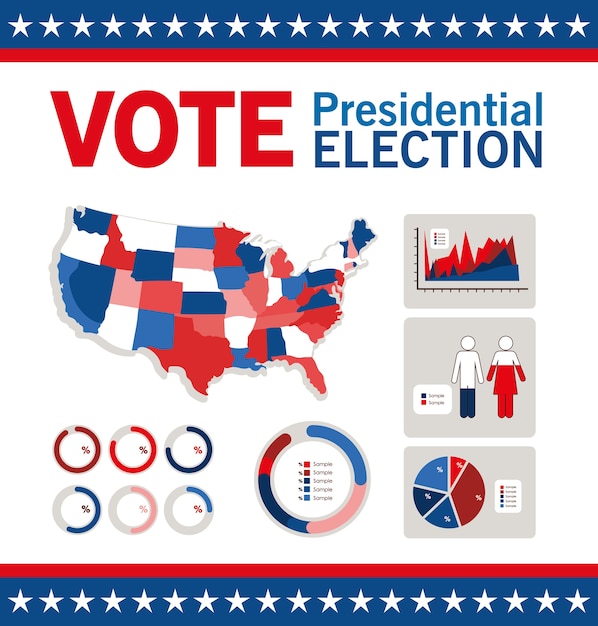Be Prepared: Navigating the Election Cycle Impacts in the USA

Be Prepared: How to Navigate the Potential Impacts of the Upcoming Election Cycle involves understanding the possible shifts in policies, economy, and social dynamics that can affect individuals, businesses, and communities across the United States.
The upcoming election cycle in the United States brings with it the potential for significant changes across various sectors. To Be Prepared: How to Navigate the Potential Impacts of the Upcoming Election Cycle, it’s essential for individuals and businesses to understand the possible shifts and proactively plan for different scenarios.
Understanding the Election Landscape in the US
The American election system is a complex process involving primaries, caucuses, and the general election. Understanding this landscape is the first step in preparing for the potential impacts of the election cycle. Here’s an overview of the key elements:
The Primary Process
Before the general election, each major party holds primary elections or caucuses to determine their nominee. These contests can be highly competitive and often shape the policy platforms for the general election.
Key Election Dates
Staying informed about critical dates such as primary elections, voter registration deadlines, and the general election day is crucial. These dates can influence voter turnout and, ultimately, the outcome of the election.
- Primary elections and caucuses across different states.
- National party conventions to formally nominate candidates.
- Debates between candidates for various offices.
- Voter registration deadlines in each state.
Being aware of these elements can help individuals and organizations better anticipate the potential outcomes and prepare accordingly.

Economic Impacts of Election Outcomes
Elections significantly influence the economy. Policy changes related to taxation, trade, and regulation can have immediate and long-term effects. Understanding these potential changes is crucial for financial planning.
Potential shifts in fiscal policy
Depending on who wins the election, there could be significant changes to tax laws, government spending, and debt management. These shifts can affect everything from individual income to corporate profits.
Trade and international relations
Elections can lead to changes in trade agreements, tariffs, and international relationships. These shifts can impact industries that rely on imports or exports.
Economic preparedness involves staying informed about the candidates’ platforms and how their proposed policies could affect different sectors. This knowledge enables businesses and individuals to make informed decisions and adjust their strategies accordingly.
Social and Cultural Shifts Post-Election
Elections not only impact policy but also shape social and cultural norms. Understanding these potential shifts can help individuals and communities adapt to changing environments. The election could affect various aspects of society:
Changes in social regulations
Depending on the election outcome, laws and regulations related to social issues such as healthcare, education, and civil rights can undergo significant changes.
Cultural Narratives and Values
Elections can influence public discourse and cultural values. Shifts in leadership can lead to changes in how society views diversity, equity, and inclusion.

Adaptation involves developing cultural competence and understanding different perspectives. Proactive planning can help communities navigate these shifts more effectively.
Policy Changes and Their Implications
New administrations often bring significant policy changes across various sectors, including healthcare, education, and the environment. Examining these potential changes is a key part of election preparedness. What can you expect?
Healthcare Reforms
Healthcare policy is often a focal point of elections. Changes to the Affordable Care Act or other healthcare regulations can affect access to care and insurance costs.
Education Initiatives
New initiatives can impact funding for schools, curriculum standards, and access to higher education. These changes can have long-term effects on students and educators.
- Analyzing proposed policy changes by candidates.
- Evaluating potential impacts on personal and professional life.
- Engaging with community discussions and advocacy efforts.
Staying informed and engaged can help individuals and organizations navigate these changes more effectively.
Personal and Financial Planning
Being prepared for election outcomes includes taking proactive steps in personal and financial planning. This involves assessing your financial situation, reviewing your investment portfolio, and making necessary adjustments.
Assessing Financial Situation
Reviewing your budget, savings, and debt levels can help you prepare for potential economic changes that may arise from the election.
Investment Strategies
Diversifying your investments and seeking advice from financial professionals can help mitigate risks associated with market fluctuations following the election.
Taking these steps can provide a sense of security and control during times of uncertainty.
Community Engagement and Advocacy
Participating in community initiatives and advocating for your values can amplify your voice and influence policy decisions. Here are a few tips on how to get involved in your community:
Supporting Local Organizations
Getting involved with local charities, community groups, and neighborhood associations can provide opportunities to address local issues and promote positive change.
Engaging with Elected Officials
Corresponding with your representatives and attending public forums can help ensure that your voice is heard on important policy matters.
- Joining community dialogues.
- Volunteering for local organizations.
- Advocating for informed and fair policies.
Engagement allows individuals to collectively address potential challenges and create a more resilient and inclusive society.
| Key Aspect | Brief Description |
|---|---|
| 🗳️ Election Dates | Stay informed on primaries, conventions, and general election day. |
| 📈 Economic Impact | Fiscal policy changes can affect taxes, trade, and international relations. |
| 🤝 Community | Engage in local initiatives for a more resilient society. |
| 💰 Finance | Review financial situation and investment portfolio. |
Frequently Asked Questions
▼
Key dates include primary elections, national conventions, candidate debates, and voter registration deadlines. Staying informed ensures you can participate and understand the process.
▼
Elections can influence tax policies, government spending, and trade agreements, affecting individual income and investment returns. Review your financial plan to adapt accordingly.
▼
Changes in laws and regulations related to healthcare, education, and civil rights are possible. Staying informed and adapting to new social norms is essential.
▼
Support local organizations, attend community forums, and communicate with elected officials. Active engagement can amplify your voice and contribute to policy decisions.
▼
Analyze candidates’ platforms, evaluate potential impacts on your life, and engage in constructive dialogues. Staying informed helps you navigate and adapt to new policies.
Conclusion
As the election cycle progresses, being informed, proactive, and engaged is crucial to navigate the potential impacts. By understanding the election landscape, planning for economic and social shifts, and actively participating in your community, you can ensure a more resilient and secure future in the United States.
